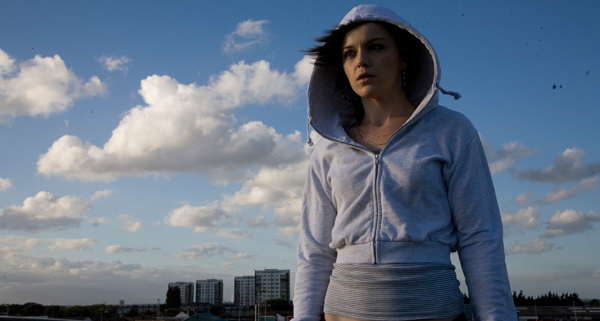
Directed by Andrea Arnold
The UK has a proud tradition of social realist cinema, pioneered by the so-called British New Wave in the mid-1960’s and the grimly dour, class conscious debuts of Karel Reisz, Tony Richardson and Lindsay Anderson. Although the contemporary British film industry primarily serves as an adjunct to the Hollywood blockbuster machine, keeping their immensely skilled technicians and RADA-trained actors with roofs over their heads with the likes of the Bond and Potter franchises, occasionally a small, modestly ambitious UK film manages to get local funding and connects with a domestic audience. Last year it was Shifty, a lean, compact tale of 24 hours in the life of a London crack dealer which echoed the work of both Alan Clarke and Ken Loach, and once again this year mockney gun-play, racially neutered middle class rom-coms and elegant yet tedious 19th century period drama did not entirely dominate the indigenous screen output thanks to Fish Tank, a slice of contemporary working class English life, a bleak yet poetic tale set amongst the tabloid baiting hoodies and chavs which explores the limited chances this maligned underclass have to escape their poverty-stricken cages.
Set in the grim council estates of Essex on the outskirts of northeast London, Fish Tank is the story of Mia, an alienated yet feisty 15-year-old whose life is utterly devoid of love or affection.. Her young, emotionally abusive mother (Angie from Ken Loach’s overlooked It’s A Free World…) drinks and habitually ignores the needs of both Mia and her younger sister Sophie. Mia harbors a secret passion to be a dancer – one she hesitantly, secretly practices in an abandoned flat in one of the squalid high-rise blocks that neighbors her home. Just as news of her imminent placement in a borstal-type facility arrives, Mia’s mother brings home her new boyfriend Connor (Michael Fassbinder), who subsequently encourages and befriends Mia, the only glimpse of consideration in her desolate existence.
 Andrea Arnold’s 2006 debut Red Road impressed critics with its vivacious, CCTV mediated portrayal of Glasgow, and like Fish Tank it also had a woman as a central character, which makes a refreshing change when judging by recent trends a central protagonist with ovaries is either a) trying to get married b) used to be in Friends or c) is trying to get married and used to be in Friends. Arnold captures the liveliness and desolation of the impoverished communities with an acute beauty, simultaneously portraying a dreary world which is nevertheless occasionally punctuated with grim laughter, a uniquely British blitz spirit type of humor in the face of despair. Newcomer Katie Jarvis, who plays Mia, is thoroughly believable and sympathetic despite her understandable failings and aggressive temperament. Apparently Arnold spotted her at a train station arguing with her boyfriend and cast her on the spot – she had never acted before.
Andrea Arnold’s 2006 debut Red Road impressed critics with its vivacious, CCTV mediated portrayal of Glasgow, and like Fish Tank it also had a woman as a central character, which makes a refreshing change when judging by recent trends a central protagonist with ovaries is either a) trying to get married b) used to be in Friends or c) is trying to get married and used to be in Friends. Arnold captures the liveliness and desolation of the impoverished communities with an acute beauty, simultaneously portraying a dreary world which is nevertheless occasionally punctuated with grim laughter, a uniquely British blitz spirit type of humor in the face of despair. Newcomer Katie Jarvis, who plays Mia, is thoroughly believable and sympathetic despite her understandable failings and aggressive temperament. Apparently Arnold spotted her at a train station arguing with her boyfriend and cast her on the spot – she had never acted before.
 After the triumph of Hunger and a move toward the international stage in Inglourious Basterds, Michael Fassbinder is developing into a consistently astonishing talent, seemingly effortlessly turning in solid, robust performances. What he manages is that most elusive of skills, you don’t notice him acting, he just ‘is.’ You’re never quite sure if he has any ulterior motive in his relationship with Mia and her mother, in fact you’re not sure if there is any motive at all – a testament to the naturalism and skill of his achievement. Special kudos also goes to Rebecca Griffiths as Mia’s younger sister – she is absolutely hilarious and has one line ( ‘I like you. I’ll kill you last’) which in context is funnier than the last dozen or so called ‘comedies’ that have slithered out from British shores. Whilst not exactly treading new ground – it’s less politically inclined than Ken Loach or theatrically mannered than Mike Leigh – the film operates in a realm well-trod in UK cinema and serves as a welcome antidote to the adrenaline-fueled demands of the summer season. Having won kudos at both the Cannes and Edinburgh International film festival, Fish Tank deserves as wide an international audience as possible, if only to remind viewers that we’re not just a nation of tea-swilling, stammering buffoons and second-tier, post-colonial action movie villains.
After the triumph of Hunger and a move toward the international stage in Inglourious Basterds, Michael Fassbinder is developing into a consistently astonishing talent, seemingly effortlessly turning in solid, robust performances. What he manages is that most elusive of skills, you don’t notice him acting, he just ‘is.’ You’re never quite sure if he has any ulterior motive in his relationship with Mia and her mother, in fact you’re not sure if there is any motive at all – a testament to the naturalism and skill of his achievement. Special kudos also goes to Rebecca Griffiths as Mia’s younger sister – she is absolutely hilarious and has one line ( ‘I like you. I’ll kill you last’) which in context is funnier than the last dozen or so called ‘comedies’ that have slithered out from British shores. Whilst not exactly treading new ground – it’s less politically inclined than Ken Loach or theatrically mannered than Mike Leigh – the film operates in a realm well-trod in UK cinema and serves as a welcome antidote to the adrenaline-fueled demands of the summer season. Having won kudos at both the Cannes and Edinburgh International film festival, Fish Tank deserves as wide an international audience as possible, if only to remind viewers that we’re not just a nation of tea-swilling, stammering buffoons and second-tier, post-colonial action movie villains.
John Mcentee
